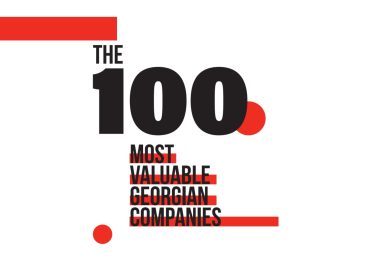We are pleased to present the 33rd English issue of Forbes Georgia. This issue features a variety of articles on topics such as business, entrepreneurship, and economics. We hope you enjoy reading it as much as we enjoyed putting it together.
Cover Story: From Idea to Invention: The Threads of Youth
Marlen Sulamanidze revolutionized aesthetic medicine with his innovative method. Today, Aptos, the company he founded, is a world leader. He runs the company alongside his sons, George and Konstantin Sulamanidze.
This edition also features the latest insights, analysis, and trends from the dynamic world of business, finance, and entrepreneurship in Georgia and around the world.
◾ A Ranking of the Countries Aiding Georgia
From 2008-2022, Georgia received a total of $8,973,700,000 in official bilateral aid, with the United States being the largest contributor.
◾ The Most Sanctioned Countries
Over the course of the 21st century, countries have been employing the practice of sanctions with increased frequency. This trend has been facilitated by globalization. As countries are economically interdependent, sanctions can cause them substantial economic damage. Sanctions are usually the price paid by governments for certain political decisions.
◾ TOP 10 Investor Countries: Which Sectors Benefit from Their Investment?
In 2023, ten countries accounted for up to 90% of FDI in Georgia. This article will examine the industries that attract investment from these top 10 investor countries.
◾ The Largest Offshore Companies in Georgia
The average value of the assets of Georgia’s top twenty offshore or partially offshore companies in 2021-22 totaled ₾3.6 billion. Offshore companies have always been prevalent in Georgia, but they began attracting more attention after changes to the Georgian tax code.
◾ The Foreign Agents Bill – Serving Russian Interests
The law on transparency of foreign influence, or the Foreign Agents Bill, which the Parliament of Georgia adopted on the first reading on 17 April, renders any NGO receiving more than 20% of its financing from abroad an “organization pursuing the interests of a foreign power.” The United States Foreign Agents Registration Act (FARA) is often cited as one of the main arguments for adopting the bill. This argument is false because FARA applies to political lobbyists, not to European or international NGOs.
◾ The Law of Russian Authority
Against the backdrop of the protests against the “Russian law,” the state PR machine has sought to falsify the narrative about the ongoing confrontation and steer it in a direction that the government can easily sell to the electorate.
◾ Georgia at a Crossroads: Emery Paper or Velvet?
Over the past weeks, a large-scale protest movement has been gathering pace across the country and is probably yet to peak. The reason for the protests is the same as a year ago: the so-called “Foreign Agents Bill,” which Georgian Dream re-introduced on April 7 despite their promise not to do so after their defeat last year.
◾ Free Internet for Education
The charity campaign Charte (“give internet”) was launched by informal education enthusiasts. It has attracted donations in excess of ₾2 million and helped increase access to digital education by connecting more than 2,500 socially vulnerable children to the internet.
◾ Leading the Transformation
Ana Nikoladze and Rati Mekhrishvili, the architects of Liberty’s corporate banking department, have led a team of 20 professionals to manage credit and deposit portfolios for 500 business clients. Since the beginning of 2023, Liberty’s corporate credit portfolio has increased by more than 40 percent, while the deposit portfolio has increased by 20 percent.
◾ History in a Bottle
With a workforce of more than 1,500 employees and Giorgi Salakaia at the helm, Badagoni tells the story of Georgian winemaking through the 12 million bottles of wine it exports to over 35 countries worldwide. Along with restoring cultural heritage and developing traditional approaches to winemaking, Badagoni is also expanding its activities into the field of hospitality. Founder Giorgi Salakaia spoke to Forbes Georgia about the company’s achievements and plans.
◾ A Global Vision for Education
With new campuses, unique educational programs, and a broad network of international partnerships, Kakha Shengelia and his Caucasus University team are preparing for global expansion.
◾ From Idea to Invention: the Threads of Youth
Marlen Sulamanidze revolutionized aesthetic medicine with his innovative method. Today, Aptos, the company he founded, is a world leader. He runs the company alongside his sons, George and Konstantin Sulamanidze. Forbes Georgia sat down with them to discuss the company’s history, game-changing invention, and plans for the future.
◾ An Artist Against the Elite
In 2023, Giorgi Gigashvili won the prestigious Arthur Rubinstein International Piano Master Competition. At the age of 23, he has already established himself as a key figure in contemporary Georgian academic music and a prominent member of Forbes Georgia’s 30 Under 30 list. Pianist Nino Zhvania interviewed the young Georgian artist on behalf of Forbes Georgia.
◾ 30 Under 30 – 2024 List
Forbes Georgia has selected leaders under the age of 30 for its 30 Under 30 project for the sixth time. This year’s ranking evaluates newcomers based on their achievements, reputation, leadership potential, and success in their fields.
◾ Navigating Tourism and Economic Growth in Dubai
Forbes Georgia sat down with mr. Issam Kazim, CEO of the Department of Economy and Tourism in Dubai, to explore the distinctive strategies and initiatives shaping Dubai’s global standing. Mr. Kazim provided unique insights into Dubai’s visionary approach, its pioneering sustainability efforts, its culture of innovation, and its appeal as a vibrant and livable city.
◾ How Much Western Money is Flowing Into Georgia?
Instead of implementing the European Commission’s “Nine Steps” and keeping the country on the path towards European integration, Georgian Dream chose to steer Georgia away from the European Union. At the same time, members and supporters of the government amplified anti-western rhetoric, jeopardizing economic relations between Georgia and the West.
◾ From Cairo to Waterloo – Georgians in Napoleon’s Army
The wars that followed the French Revolution and lasted until Napoleon Bonaparte’s final defeat in 1815 involved people of many nationalities. The geographical scope of the Napoleonic Wars spilled outside Europe and encompassed the Americas, Asia, and the rest of the world. Among the multinational armies that fought for Napoleon were the Georgians, who first encountered this great historical figure in Egypt.
Forbes Georgia: სარედაქციო გუნდი
















